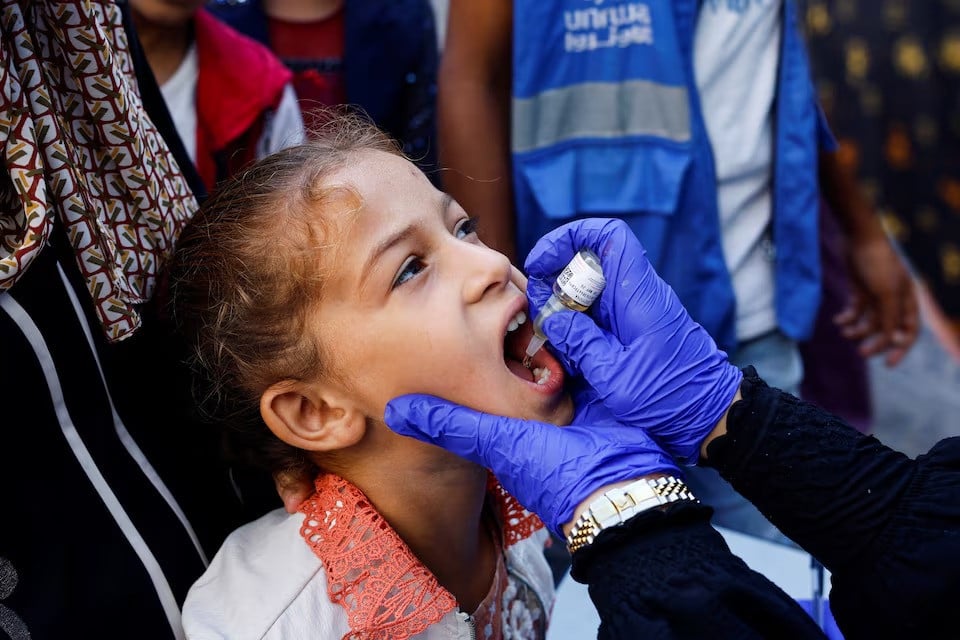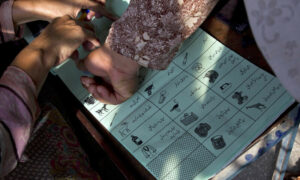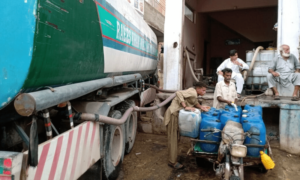GAZA CITY:
In the past 48 hours, Israeli airstrikes across the Gaza Strip have resulted in the deaths of at least 61 people, according to Palestinian medical sources, as Israeli forces engaged with Hamas-led fighters. Despite 11 months of ongoing conflict, numerous diplomatic efforts have yet to yield a ceasefire or secure the release of Israeli and foreign hostages held by Hamas in Gaza.
Among the targets of the Israeli airstrikes were two former schools in Gaza City and Jabalia, which had been housing displaced individuals. These strikes reportedly claimed the lives of at least 12 people.
The Israeli military stated that these strikes were aimed at Hamas gunmen operating within the compounds. A further five individuals lost their lives in an airstrike on a house in Gaza City, bringing the death toll on Saturday to 28.
Palestinian resistance groups, including Hamas, Islamic Jihad and Fatah, reported engaging Israeli forces with anti-tank rockets, mortar bombs, and explosives intended for Israeli tanks and military vehicles.
The two sides continued to trade blame over the failure of mediation efforts by Qatar, Egypt, and the United States to broker a ceasefire.
The United States is set to propose a new plan, but optimism for a resolution remains low as significant disagreements persist. William Burns, the CIA Director and leading US negotiator, revealed in a London event that a more comprehensive proposal would be presented in the coming days.
Mass protests erupted in Israel, with tens of thousands of demonstrators taking to the streets of Tel Aviv and other cities, calling for Prime Minister Benjamin Netanyahu and his government to secure a deal that would ensure the release of the remaining 101 hostages.
This wave of protests followed the discovery of six hostages who had been executed by Hamas in a Gaza tunnel last Saturday. Israeli authorities stated that the hostages had been shot in the head, and their deaths sparked widespread anger and grief.
Einav Zangauker, whose son Matan was abducted by Hamas from his home in Nir Oz kibbutz, expressed her frustration, claiming that “as long as Netanyahu is in power, we will keep getting the hostages back in body bags.”
On Thursday, US Secretary of State Antony Blinken urged both Israel and Hamas to make concessions to reach a ceasefire agreement. Hamas, which has controlled Gaza for nearly two decades and was responsible for the October 7 attack in Israel that triggered the current conflict, reiterated its commitment to a July 2 proposal backed by the United States.
Senior Hamas official Hossam Badran stated that the group had not introduced any new demands, while accusing Netanyahu of imposing new conditions. Netanyahu, however, maintains that Hamas is responsible for introducing unacceptable terms.
The latest escalation in the longstanding Israeli-Palestinian conflict was ignited by a Hamas attack on Israel on October 7, which resulted in the deaths of 1,200 individuals, mostly civilians, and the abduction of approximately 250 hostages. In response, Israel launched an assault on Gaza, which, according to local health ministry figures, has claimed the lives of over 40,900 Palestinians and displaced nearly the entire population of 2.3 million.
The Palestinian health ministry does not differentiate between combatants and civilians in its casualty reports, though health officials indicate that most of the victims have been civilians. Israel, which has lost 340 soldiers in Gaza, estimates that at least a third of the Palestinian casualties are fighters.
Anti polio drive
Amidst the ongoing conflict, the United Nations, in coordination with local health authorities, has initiated a campaign to vaccinate 640,000 children in Gaza following the detection of the region’s first polio case in around 25 years.
Despite the challenges posed by the fighting, limited pauses have enabled the vaccination campaign to progress. UN officials reported that they had successfully administered vaccinations to more than half of the children in the southern and central Gaza Strip.
On Sunday, the campaign is set to expand to northern Gaza, with a second round of vaccinations scheduled four weeks after the initial dose.







